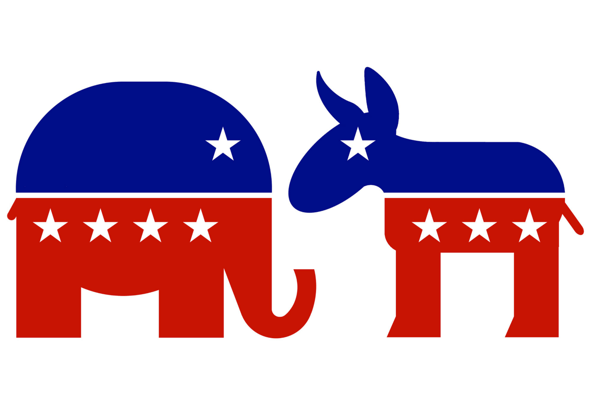
Resources to Engage Students in Political Debate
Pardon our faux pas as we discuss the topics covered in the primary elections.
The polls are closed in New Hampshire and Iowa and candidates are busy preparing for tomorrow's South Carolina Republican Primary and Nevada Democratic Caucus. Nearly everyone in the country is gearing up for another long election season.
Citizens expect voters in these early primary states to make well-informed decisions and back the best contenders for each party because of the potential impact on subsequent voting decisions. Well-informed decision-making is an important part of the democratic process and a skill that students need to learn to become responsible citizens. Luckily, we’ve created a guide to help you bring the elections right to your classroom.
As the results of the primary elections roll in, engage your students in critical thinking and argumentation about important national issues using the CERCA Framework and our close reading and argumentative writing lessons. After completing these lessons, ask students to follow these debate guidelines: consider the key question, provide two reasons with at least one piece of evidence for each reason to support your claim, and work with a partner to eliminate duplicates and refine wording. Discuss topics in education, immigration, economy, health care, foreign policy, the environment, and more!
PLUS: Download our debate game handout and hold your own caucus with students.
Sign up for a basic account to view these lessons >>
Free Close Reading Lessons
- Food Pyramid How have the U.S. government's recommendations for healthy eating changed over time?(Grades 3-5; CCSS.CCRA.R.7)
- Armbands Against the War Should schools get to decide how students are allowed to express themselves? (Grades 3-5; CCSS.CCRA.R.8)
- The History and Process of Voting Why is voting a civic responsibility?
- (Grades 3-5; CCSS.CCRA.R.8)
- Plate Over Pyramid Why is MyPlate a better graphic than the food pyramid to explain healthy eating? (Grades 3-5; CCSS.CCRA.R.7)
- Geo-Medicine Is geoengineering a promising way of combating climate change, or should people take responsibility and stop burning fossil fuels and creating garbage? (Grades 6-8; CCSS.CCRA.R.6)
- We the Economy: Recession What are the causes and effects of recession on a society? (Grades 6-8; CCSS.CCRA.R.7)
- Vanishing Glaciers What is the most dangerous potential impact of melting glaciers? (Grades 6-8; CCSS.CCRA.R.8)
- The Past Is Present: Just a Ferry Ride Away Why was there a national effort to preserve and restore Ellis Island? (Grades 6-8; CCSS.CCRA.R.6)
- Rebuilding the Food Pyramid How might Harvard's Healthy Eating Pyramid affect the health of Americans? (Grades 6-8; CCSS.CCRA.R.9)
- Barriers and Obstacles What are some of the possible challenges to the idea that all citizens have equal voting rights? (Grades 6-8; CCSS.CCRA.R.6)
- The Grim Economics of Food Stamps Should the government increase or decrease the food stamp benefit? (Grades 9-10; CCSS.CCRA.R.8)
- Drugs, Caffeine, Chemicals Found in Great Lakes Worry Researchers Should a mix of PCPPs found far offshore in Lake Michigan be enough to convince water treatment officials to install expensive equipment, or should they wait until more is known about the dangers? (Grades 9-10; CCSS.CCRA.R.8)
- The Problem with the Electoral College Should the Electoral College be disbanded? (Grades 9-10; CCSS.CCRA.R.1)
- Experts Set Threshold for Climate-Change Calamity With evidence pointing to rising carbon dioxide levels being the main cause of climate change, why are our governments so slow to make changes, and what action can the global community take to reverse this? (Grades 11-12; CCSS.CCRA.R.8)
- We the Economy: Your Tax Dollars At Work How should the federal government spend our tax dollars? (Grades 11-12; CCSS.CCRA.R.2)
- We the Economy: This Won't Hurt a Bit According to the film, what are three reasons why health care costs so much in the United States? (Grades 11-12; CCSS.CCRA.R.5)
- We the Economy: Amazing Animated Film on the Debt and Deficit How do debt and deficit affect our economy as a whole? (Grades 11-12; CCSS.CCRA.R.8)
- We the Economy: Taxation Nation Why is the U.S. tax system so complex? (Grades 11-12; CCSS.CCRA.R.1)
- We the Economy: The Value of Work What are the pros and cons of a $15/hour minimum wage?(Grades 11-12; CCSS.CCRA.R.6)
- TED Talk: Government Surveillance Do the potential benefits of government surveillance outweigh the risks? (Grades 11-12; CCSS.CCRA.R.7)
- Troubling Disclosures Are Likely to Change How the NSA Does Its Spying What, if any, limits should there be on how the NSA gathers intelligence? (Grades 11-12; CCSS.CCRA.R.1)
- Amezaga Has Come Long Way Since Parents Sent Him from Mexico to Miami How do immigrants like Amezaga strengthen America? (Grades 11-12; CCSS.CCRA.R.1)
Differentiated Lesson Sets for Grades 4-12
- The Electoral College Should we continue to use the Electoral College as part of the process of electing a President in the United States? (CCSS.CCRA.R.4; CCSS.RH.4; CCSS.W.1; CCSS.WHST.2)
- School Policy How can we improve student learning? (CCSS.RI.2; CCSS.W.1)
- Voting Should the United States consider modifying the way citizens elect their leaders? (CCSS.CCRA.R.1; CCSS.RH.1; CCSS.W.2; CCSS.WHST.1)
- Social Responsibility How do individuals stand up and take responsibility for changing their societies? (CCSS.RI.9; CCSS.W.1)
- Supreme Court Decisions: Free Speech What evidence and reasoning has the Supreme Court used to protect or deny an individual’s right to free speech? (CCSS.RI.8; CCSS.W.1)
- Technology and the Fourth Amendment How does the 4th Amendment protect our rights even as technology changes? (CCSS.CCRA.R.1; CCSS.RH.1; CCSS.W.1; CCSS.WHST.1)
Introductions to Key Skills & Concepts
- Making Arguments about Point of View (Grades 3-5; CCSS.CCRA.R.6)
- Making Arguments about Point of View (Grades 6-12; CCSS.CCRA.R.6)
- Making Arguments about Multiple Perspectives (Grades 3-5; CCSS.CCRA.R.6)
- Making Arguments about Multiple Perspectives (Grades 6-12; CCSS.CCRA.R.6)
- How to Deliver an Oral Presentation (Grades 3-5; CCSS.CCRA.SL.4)
- How to Deliver an Oral Presentation (Grades 6-12; CCSS.CCRA.SL.4)
- Evaluating Sound Arguments (Grades 3-5; CCSS.CCRA.R.8)
- Evaluating Sound Arguments (Grades 6-12; CCSS.CCRA.R.8)
- Rules of Discussion (Grades 3-5; CCSS.CCRA.SL.1)
- Rules of Discussion (Grades 6-12; CCSS.CCRA.SL.1)
